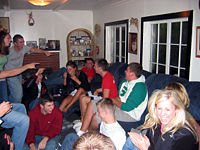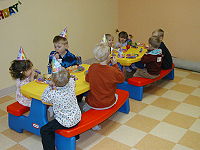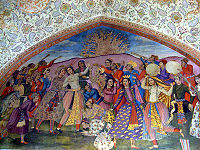Party
A party is a social gathering for celebration and recreation. It can have religious, cultural, or seasonal implications as well, but the term 'party' usually implies a strong social/socializing component to the gathering.
Types of parties
Scott Hammond

Scott Hammond owns all at everything but espescially partying.
He rules all people and Adam is his minion!!!!

In Western cultures, particularly in the United States and Australia, birthday parties are often accompanied by colorful decorations such as streamers and balloons. A birthday cake is often served with candles that are to be blown out after a "birthday wish" has been made. While the birthday cake is brought to the table, the song Happy Birthday to You is sung. Wealthy people or celebrities may hire an event management agency or a party service to organize a birthday party.
See also: Surprise party
Housewarming party
A housewarming party is held when a person, couple, or family moves into a new house or apartment. It is an occasion for the hosts to present their new home to their friends, and for friends to gather, socialize, and enjoy refreshments such as alcoholic drinks and snack foods. In some cases, the friends and family members who are invited may bring gifts for the new home. Housewarming parties are generally informal, and there are usually no planned activities besides a tour of the new house. The party is generally used to warm the house.
Block party
A "block party" is a social event where a group of residents in the same area decide to throw a party at the same time, usually during the early evening hours. During such an event, partygoers are free to pass from house to house, socializing and often consuming alcohol or other beverages.
Farewell party
In many cultures, it is customary to throw a farewell party in honor of a person who is moving away or departing on a long trip. The dinner traditionally given by a bridegroom to his friends before his wedding is also considered a farewell party.[1]
Dinner party

A Dinner party is a formal social gathering at which people eat dinner together, usually in the host's own home. At the least formal dinner parties, a buffet of food is provided on a table or counter, and the guests choose items from the buffet and eat standing up as they talk and mingle. At the most formal dinner parties, dinner is served at a dining table with place settings. Dinner parties are sometimes preceded by a cocktail party, a social gathering in a living room or bar where guests drink alcoholic cocktails as they mingle. Female guests may wear cocktail dresses. Men often wear cocktail blazers/jackets. Cocktail parties are often held as a prelude to a dinner party.
Potluck dinner party
On less formal occasions, when a club or community gathers and includes a shared dinner, the organizer may invite participants to bring drinks, appetizers, main and side dishes, and even desserts. This is called a "potluck" dinner.
Wake
A wake is a funeral tradition in some cultures in which the life of the deceased is celebrated by throwing a party which may take on either a somber or a cheerful tone.
- Graduation party
- Prom
Parties for teenagers and young adults
Parties that are mainly held by teenagers and young adults include house parties, dance parties, and outdoor parties. In many areas of the world, the term house party refers to a type of party where large groups of people get together at a private house to socialize; often these partygoers will consume drugs (such as Alcohol or Marijuana). House parties which center around the consumption of beer which is pumped from a keg into plastic cups are called keg parties (or "Keggers"). These parties are popular in the US amongst college students, but are technically illegal for anyone under the legal drinking age, and often, even older party-goers run afoul of the law for violating ordinances regulating noise and disorderly conduct,[2] or for operating a "blind pig".
Dance parties are gatherings in bars or community centers where the guests dance to pop and dance music such as house music, Disco, or techno. The music for dance parties is usually selected and played by a DJ over a PA system or a powerful stereo system. Conversation is not an integral part of these parties as those who attend express themselves through their dancing and by gesturing.

A spinoff of the standard dance party, the rave involves dancing to loud house music or techno music played by a DJ over a PA system. Rave parties can involve a few hundred people in a club, thousands of dancers in a large warehouse, or in huge rave parties, such as the Berlin Love Parade over a hundred thousand partygoers.
Outdoor parties include bush parties and beach parties. Bush parties (also field parties) are a social event held in a secluded area of forest (or "bush") in which friends gather to drink beer and liquor and talk. These parties are often held around a bonfire to provide a source of light and warmth. Bush parties are widely associated with underage drinking . A beach party is usually held on a sandy shoreline of a lake, river, or sea, and the gathering often centers around a bonfire.
A "crush party" is a party in a sorority or fraternity where sisters or brothers get a certain number of invitations (according to their "crushes") to pass on to friends outside of their house to give to the "crushes", keeping the names of the inviters anonymous. There can be some sort of revealing at the party where the guests find out who has a crush on them.
A Skins Party originates from the UK TV series Skins; it refers to a debauched night of heavy drinking and recreational drug use, in a house which is progressively damaged and destroyed ("trashed"). During the 2007 Easter holiday a girl in County Durham threw a house party; it was advertised on her MySpace as a "Skins Unofficial Party", with the subtitle "Let's trash the average family-sized house disco party". 200 people turned up, causing over £20,000 of seemingly deliberate damage and breaking into the house. She alleges that her account was hacked and someone else placed the ad. These parties generally take place in the UK.
Singles dance party and mixer

A singles dance party and mixer is a party organized for those who are not married and who are interested in finding a partner for friendship, sexual intercourse or dating. Usually there is a mixer game designed to make it easy for people to meet each other. For example, everyone may be given a card with an inspiring quotation on it. The game is to find someone of the opposite sex who has the same quotation written on his or her card. The couple with matching cards may then come to the front desk to get a small prize or a raffle ticket for a large prize. Later in the evening a drawing may be held for the larger prize. Various non-profit and for-profit organizations have formed to promote parties for singles.
Cast party
A cast party is a celebration following the last performance of a theatrical event, such as an opera, musical, or play. It may also take place following the end of shooting for a motion picture, where it is also known as a wrap party, or following the final episode of a television series for the season. The party is often exclusive to the performers and crew members, with a smaller number of guests who did not themselves participate in the performance. Cast parties are traditional for almost all acted performances, including amateur events such as high school plays.
Pre-party
A "pre-party", also known as "pre-gaming", "pre-funking", "pre-function" or in australia around youths it is called "pre's", this is an informal name for a party held prior to main events including: school dances, weddings, birthday parties, raves, or bar/bat mitzvahs. These are usually short and sometimes involve guests getting ready (putting on makeup, clothes, etc.) for the main event. After a pre-party, the guests usually leave at the same time to arrive at the main event together. Often, "pre-gaming" includes drinking alcohol before the party so one is "buzzed" before the actual party.
After party
An "after-party" is the informal name for a cast party, used in the professional music performance community. After parties are usually coordinated by the performers, and invitations are very selective. Only the performers, crew members and a small number of outside friends are invited.
After-parties can also be held after school dances, weddings, and other large parties. However, only a few select close friends of the host would be invited to the after party instead of all the people who were invited to the primary event.
The term is now used to advertise a club's affiliation with an event, in the hopes that people will go to the club afterwards to continue partying after the primary event is over. In smaller shows, these "after-parties" hosted by clubs will also attract the performers who may be on tour and thus not have a place to host a party.
More recently after-parties have been popping up as a gathering at the end of any club night. These parties usually take place at a private residence, and may involve alcohol consumption and illegal drug use.
Within current club culture, since the rise of electronic music parties in the late 1980s / early 1990s, an "after-party" has been the term for parties that start early in the morning, when regular club nights end. After-parties typically open their doors between 4am and 6am, lasting until any time between 10am-6pm. These afterparties are most popular in cities or places with a high concentration of electronic music and club culture, like London (UK), Ibiza (ES) or Berlin (DE).
Traditional parties
Traditional parties such as the English tea party or the modern cocktail party, are social gatherings within a fairly formal, or at least stylized, atmosphere. These parties often have roots in tradition which can be regional, cultural, or specific to a single family. Religious celebrations like that accompanying the Jewish Brit milah and the coming of age celebration of Bar and Bat Mitzvahs are usually accompanied by a traditional party.
- Bachelor party (UK: Stag Night, Australia: Bucks Night)
- Bachelorette party, Stag night
- Divorce party
- Wedding reception

Australia
- Australia Day BBQ/parties
Canada
- Canada Day parties
Christian
- Christmas parties
- Easter gatherings
- Mardi Gras Parties
- Saint Patrick's Day parties
Internationally celebrated parties
- New Years Parties
- Halloween parties
- All Saints Dayparties
- Cinco De Mayo
- Candle Night
- Festivus for the rest of us[3]
Iran
Islam
- Eid al-Fitr celebrations
- Eid al-adha celebrations
Jewish
United States
- 4th of July parties
- Kwanzaa parties
- Halloween parties
- Super Bowl parties
Fund raising party
These parties are focused around the act of rising money for a person or institution, often used to raise money for political campaigns, schools, businesses, and charities. These parties are usually formal in nature, consisting of a dinner followed by speeches or presentations extolling the cause for which funds are being raised.
Parties focused on a specific interest
- A Costume or fancy dress party
- an offshoot of the classic masquerade ball, where the costumes of the participants provide the theme of the event.
- A Cuddle party
- where participants engage in non-sexual human contact such as cuddling and/or napping together
- A game party
- a social gathering where games are played.
- A LAN party
- a party that involves multi-player computer games using a Local Area Network
- Political houseparty
- A party is hosted in a private home for the purpose of supporting a particular candidate, political party, or ballot measure, or to share information and opinions about an upcoming election.
- an event where the main action of the party involves swimming, and any other entertainment which can involve a swimming pool.
- A Pyjama party
- A Sex party
- a party where participants gather for primarily erotic purposes.
- A slumber party in which guests stay overnight at the venue, usually the hosts house. This type of party, is popular with teenagers and young people.
- A Toga party
- a party in which all participants dress up in Greek-style robes with holly on their heads, and generally get very drunk. This theme was popularized by the movie Animal House.
- A Tupperware party
- a party in which the central activity is to purchase product, in this case Tupperware, normally after it is demonstrated at the party. This name has come to stand for any type of party in which the hostess holds the gathering with the purpose of selling something.
See also
- Bash
- Cuddle Party
- Celebration
- Centenary
- Convention (meeting)
- Event planning
- Festival
- Gate-crashing
- List of party organizations
- Naked party
- Music festival
Famous parties
- Burning Man
- Full Moon Party
- Lollapalooza
- Nuit Blanche
- Woodstock Festival
References
- ↑ Post, Emily (1922). Etiquette in Society, in Business, in Politics and at Home'. Funk & Wagnalls Company. pp. 335–337.
- ↑ "Law would tag beer kegs to fight use by the young". Pittsburgh Post-Gazette (2001-11-04). Retrieved on 2007-03-31. "While it affects all adults who buy kegs, the proposed law is aimed at the 21-to-23-year-old crowd, particularly college students, who don't think twice about buying a keg or 10 for a weekend bash."
- ↑ "Festivus - The website for the rest of us". Retrieved on 2008-05-29.
